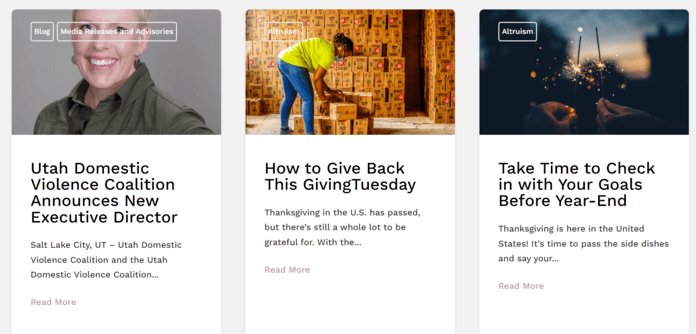Nonprofit organizations play a crucial role in nurturing community engagement and economic growth. To sustain their programs and missions, charities must maximize their limited budgets. This means employing strategies that have a proven return on investment (ROI).
Search engine optimization (SEO) is a long-term digital marketing strategy that nonprofits can use to support their causes and organizations. It can increase an organization’s discoverability in search results and drive more people to your site to donate, volunteer, or learn about your causes.
Keep reading to learn more about SEO for nonprofits:
- What is SEO for charities?
- What are the benefits of SEO for nonprofits?
- 4 SEO best practices for nonprofits
What is SEO for nonprofits?
SEO for nonprofits is a set of strategies meant to improve a nonprofit organization’s website ranking in the search engine results pages (SERPs). By ranking higher in SERPs for relevant keywords, charities boost visibility about their causes and the support they need.
For example, when a user searches for “animal welfare nonprofit volunteer opportunities in New York,” a list of organizations’ pages appears in the SERPs. Charities carrying out SEO strategies enable volunteers and donors to find their organizations.
SEO strategies also increase awareness about concerns that nonprofits are raising to drive social change.

Case study
With WebFX (the team behind SEO.com), this nonprofit saw a 110% increase in organic traffic, resulting in 248% more applications.

What are the benefits of SEO for nonprofits?
SEO has several benefits for organizations of various sizes, nonprofits included.
Nonprofits can accomplish the following with the help of SEO:
- Reach the different personas of your target audience
- Promote your charity and cause 24/7
- Boost your nonprofit’s credibility
- Improve your digital marketing efforts’ ROI
Reach the different personas of your target audience
First on our list of benefits of SEO for nonprofits is reaching a nonprofit organization’s broad target audience.

That audience could comprise:
- Donors
- Volunteers
- Potential employees
- Community members researching about charities’ causes
Implementing SEO strategies helps you reach and communicate with the different personas of your target audience. These steps involve creating content that provides information for various audience segments and stimulating interaction with them, so they can sign up for your newsletter or convert as donors.
Promote your charity and cause 24/7
Your target audience may seek information about your nonprofit organization during odd hours of the day.
When a nonprofit organization’s website is optimized for search, your target audience can find and access your relevant pages anytime they search.
For example, a potential donor may search for your organization through their mobile device while waiting for grocery deliveries. Your optimized site can appear prominently in SERPs and encourage them to click and convert on your page.
Get SEO help from nonprofit SEO pros 
Attract more donors with professional SEO services from WebFX — the team behind SEO.com that’ll bring 12,000+ hours of nonprofit SEO experience to your campaign.
Boost your nonprofit’s credibility
Do you click on the listings on the first page of SERPs? Chances are, you do — like 75% of users who visit only the first page of search results.
This behavior and statistic say that you trust search engines like Google to show you the most relevant and credible answer to your query. When your website appears on SERPs for different keywords related to a cause or charity, searchers will perceive your website and organization as trustworthy and credible.
Improve your digital marketing efforts’ ROI
Charities work with limited budgets to fund their operations, programs, and marketing efforts. By implementing SEO strategies, nonprofits invest in a long-term, continuous strategy that drives results over time.
For example, say that a children’s welfare organization’s website has a page about how patrons can donate. The organization optimizes this page for relevant keywords. After a few tweaks, the page can drive traffic and increase donations even months after the initial optimization efforts!
4 SEO best practices for nonprofits
If you want to reap the benefits of SEO for nonprofits, consider implementing these best practices for your organization:
- Conduct keyword research to target high-intent keywords
- Craft content with the latest data or statistics about your cause
- Repurpose your content for other digital marketing strategies
- Implement link-building strategies
Let’s dive into each one:
1. Conduct keyword research to target high-intent keywords
Keyword research is a critical component of any SEO campaign.

A long-tail keyword is a specific search query that has three or more words. It typically has a lower search volume than broad search terms, but they’re high-intent keywords. However, long-tail keywords related to your organization are queries from searchers likely interested in your cause or organization.
For example, say that your nonprofit is an animal shelter in Austin, Texas. You can start with the long-term keyword “donation for animal shelter in Austin” to find other relevant keywords using your keyword research tools.
Conduct keyword research using tools like Keywords Everywhere and WebFX’s KeywordsFX to target long-tail, high-intent keywords related to your programs or cause.
2. Craft content with the latest data or statistics about your cause
Nonprofit organizations typically have original data or studies related to their programs or causes. You can use this information as content on your website.
Let’s say you’re in an animal shelter. You can craft year-end content about the number of pets’ lives the organization has saved while also declaring the total donation you’ve received.
By writing helpful content about your cause and program, you establish your website’s credibility among human users and search engines. Search engines favor websites with helpful content that satisfies human users’ search intent. On the other hand, websites with thin content get penalized by Google.

Publishing unique content also establishes your authority as an expert with experience in your cause, giving search engines a positive signal to rank your page. After all, Google prioritizes sites that showcase E-E-A-T, which stands for:
- Experience
- Expertise
- Authoritativeness
- Trustworthiness
3. Repurpose your content
Make the most of your unique and useful content by repurposing it as an infographic or video. If you have original research with several key points, you can create new blog posts, social media posts, or short-form videos based on them.
4. Implement link-building strategies
Link building is a crucial SEO strategy for nonprofits. Think of links from reputable sites to your site as votes of confidence in your organization — other websites are linking to you because you’re a trustworthy charity. This directly impacts your SEO and improves your rank. Top link building tools can help identify link building opportunities for your nonprofit.
Internal linking — the process of linking the relevant pages within your website — is also an essential strategy for charities. It helps search engines understand the relationships between your pages. In addition, providing links to other relevant pages improves your site visitor’s experience on your site because it leads them to pages that answer their next search intent.
For example, say a searcher wanted to understand what agricultural cooperative organizations do and landed on one of your blog posts. After learning about your causes and the importance of organizations like yours, they want to learn how to make donations, which is their next search intent.
By linking the page about donations, they can immediately find the info they need next!
Implement SEO for nonprofits today
There’s no doubt that SEO for charities boosts an organization’s discoverability in SERPs and credibility. If you need help with implementing SEO strategies for nonprofits, reach out to SEO.com to team up with experts who are pumped to help you.
Contact us today to learn more about our SEO services!

Meet
The top digital marketing company behind SEO.com.
Ready to get results? Connect with us, today!






